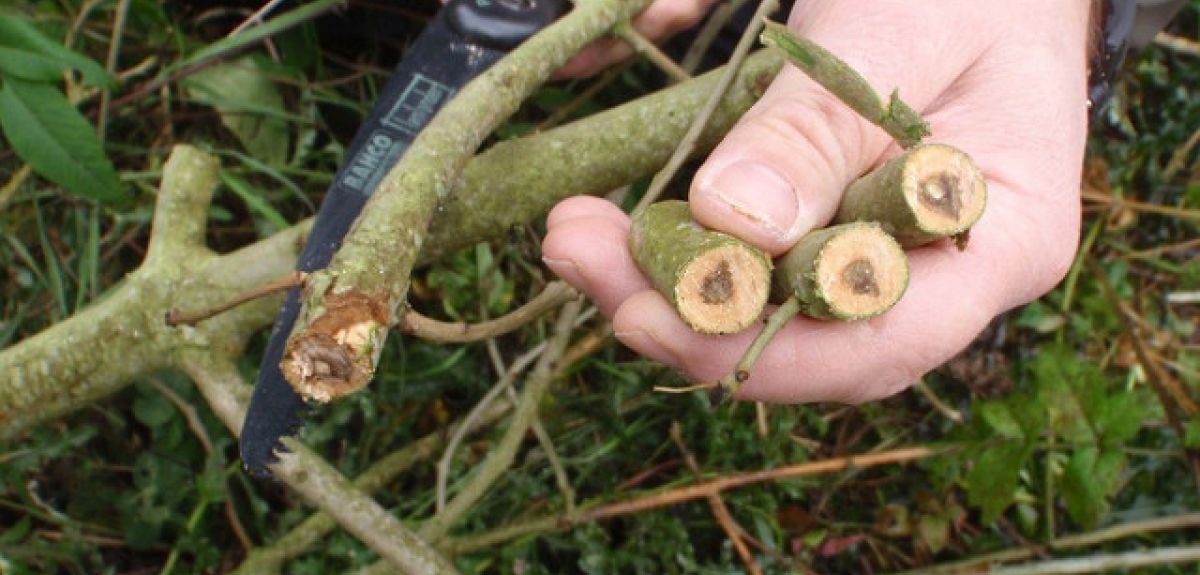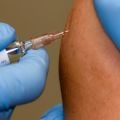
Credit: H Anderson / Woodland Trust
Ash dieback is predicted to cost £15 billion in Britain
A team of researchers from the University of Oxford, Fera Science, Sylva Foundation and the Woodland Trust has calculated the true economic cost of Ash dieback – and the predictions, published today in Current Biology, are staggering.
- The total cost of Ash dieback to the UK is estimated to be £15 billion
- Half of this (£7 billion) will be over the next 10 years
- The total cost is 50 times larger than the annual value of trade in live plants to and from Britain, which is the most important route by which invasive plant diseases enter the country
- There are 47 other known tree pests and diseases that could arrive in Britain and which may cost an additional £1 billion or more
The predicted costs arise from clearing up dead and dying trees and in lost benefits provided by trees, e.g. water and air purification and carbon sequestration. The loss of these services is expected to be the biggest cost to society, while millions of ash trees also line Britain’s roads and urban areas, and clearing up dangerous trees will cost billions of pounds.
Dr Louise Hill, researcher at Plant Sciences at the University of Oxford and lead author of the study, said: ‘The numbers of invasive tree pests and diseases are increasing rapidly, and this is mostly driven by human activities, such as trade in live plants and climate change. Nobody has estimated the total cost of a tree disease before, and we were quite shocked at the magnitude of the cost to society. We estimate the total may be £15 billion – that’s a third more than the reported cost of the foot-and-mouth disease outbreak in 2001. The consequences of tree diseases for people really haven’t been fully appreciated before now.’
Dr Nick Atkinson, senior conservation advisor for the Woodland Trust and co-author of the paper, said: ‘When Ash dieback first entered the country, no one could have fully predicted the devastating impact it would have on our native habitats. To see how this has also affected our economy speaks volumes for how important tree health is, and that it needs to be taken very seriously.
‘It is clear that to avoid further economic and ecological impacts, we need to invest more in plant biosecurity measures. This includes better detection, interception and prevention of other pests and diseases entering the country. We need to learn from past mistakes and make sure our countryside avoids yet another blow.’
The scientists say that the total cost could be reduced by replanting lost ash trees with other native trees, but curing or halting the disease is not possible. They advise that the government’s focus now has to be on preventing introductions of other non-native diseases to protect our remaining tree species.
Recommendations:
- A nationwide replanting scheme could reduce the overall cost by £2.5 billion, by ensuring that lost ecosystem services are replaced
- Greater focus on and investment in biosecurity and sourcing of safe plant material is needed to keep new diseases out
- Introduce far tighter controls on imports of all live plants for planting, as this is the largest pathway through which tree diseases are introduced
Background:
Ash dieback is a fungal disease, originally from Asia, which is lethal to Europe’s native ash trees. It was first found in Britain in 2012 and is thought to have been brought to the UK years earlier on infected imported ash trees. It is expected to kill 95-99% of ash trees in Britain.
- Read the full paper here: https://www.cell.com/current-biology/fulltext/S0960-9822(19)30331-8
 New study estimates NHS England spends 3% of its primary and secondary care budget on the health impacts of temperature
New study estimates NHS England spends 3% of its primary and secondary care budget on the health impacts of temperature
 International collaboration launches largest-ever therapeutics trial for patients hospitalised with dengue
International collaboration launches largest-ever therapeutics trial for patients hospitalised with dengue
 Oxford-built multi-agent assistant for cancer care to be piloted in collaboration with Microsoft
Oxford-built multi-agent assistant for cancer care to be piloted in collaboration with Microsoft
 World's first Phase II Nipah virus vaccine trial launch
World's first Phase II Nipah virus vaccine trial launch